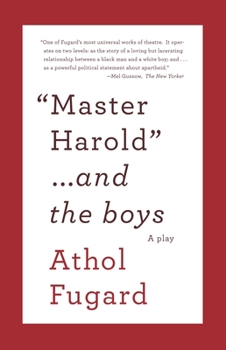Master Harold and the Boys: A Play
Select Format
Select Condition 
Book Overview
A compelling drama of South African apartheid and a universal coming-of-age story, from the greatest active playwright in the English-speaking world (Time).
Format:Paperback
Language:English
ISBN:0307475204
ISBN13:9780307475206
Release Date:October 2009
Publisher:Vintage
Length:64 Pages
Weight:0.20 lbs.
Dimensions:0.3" x 5.1" x 7.8"
Customer Reviews
5 ratings
The best play I've read
Published by Thriftbooks.com User , 18 years ago
I just finished reading this play for school and really enjoyed it. I was usually used to reading Shakespeare plays which really didn't interest me whatsoever. Then, there are those new plays that also seem to always fall short of fun reads. Well, this short play with only 3 characters actually really interested me. It was sad, tragic, funny, and very interesting. It takes place in the 50s in South Africa where racism is everly strong. In this play, there are 2 black, middle aged men, and one teenage white boy. The black men work for the boy's parents in their company and right now the boy is there alone with them as his father is in the hospital and his mother is there caring for him. At first, the 3 men seem to get along but quickly enough, racism explodes onto the pages. You see this little white boy screaming at middle aged men, treating them like dogs, taking out his aggression on them...why?...because he can. Becauseracism is everywhere and you can do whatever you want to do them. The play shows this white boy, for no apparent reason, turning from gentle and calm to angry and frustrated. Note how the crippled father shows how his point of view is crippled, showing how racist he is. Athol Fugard is a very talented writer and makes this short 1hour by yourself or 2hour oral reading in class a remarquable one. All plays should be as provoative as this one but sadly they aren't, and I strongly recommend buying this little gem, as light as a feather, that you'll be rereading a lot.
Life: "None of us knows the steps, and no music's playing"
Published by Thriftbooks.com User , 19 years ago
Set in Port Elizabeth, South Africa, in 1950, this powerful three-character play considers the interwoven relationships of young Harold (Hally), the seventeen-year-old son of the white proprietor of a tea room, and two of the African men who have worked there for years. Hally, unable to depend on his alcoholic father, now living in an institution, has always depended on Sam, the waiter, for guidance and knowledge about the real world. They share a long history in which Sam has been very much a father substitute for Hally, who has always shown him respect. Willie, the custodian, who also looks to Sam for guidance, plans to participate, along with Sam, in a ballroom dancing competition in two weeks. For them, dancing "is beautiful because that is what we want life [in South Africa] to be like." In real life, however, "none of us knows the steps...we're bumping into each other all the time." As the play progresses, the three men reminisce, talk about their ideas of what constitutes a great hero, and show their easy relationship with each other. A phone call announcing that Hally's father is being released from the hospital upsets the equilibrium, however. Hally, morose and worried about the future, fears that his father will once again destroy his world. Taking out his anger on Sam and Willie, he tears at their dreams regarding the dancing contest, mocking their goals and becoming cynical about what the contest means to them. As his frustration grows, Hally hurts them as he has been hurt by his father, demanding ultimately that both men call him "Master Harold." Based on an incident in the life of the playwright, who was strongly opposed to the policies of apartheid which began in South Africa around 1948, this powerful and poignant drama casts Sam, a black man, as a person of vision and nobility. Hally, a young white man, chooses to exert power, instead of being human, and shows that he is a lesser man than either Sam or Willie. Less a political drama than a human one, the play rises above its immediate setting to consider universal feelings and human relationships. Mary Whipple
Fugard does it again!
Published by Thriftbooks.com User , 23 years ago
I truly enjoyed Master Harold...and the Boys. Fugard creates a memorable character in Hally, a white South African boy. Hally discovers that the color of one's skin is not as important as he previously thought. Even though this is a theme prominent in Fugard's other plays, Fugard still triumphs. It falls short of My Children! My Africa!, yet remains a masterpiece in its own rite. It's difficult to explain why, but something about Hally and how he deals with others helped me to feel more "human." Definitely give it a read!
This play showed cultural barriers broken
Published by Thriftbooks.com User , 26 years ago
This play shows how cultural differences do not exist when you care for a person. Sam was as close as Hally was going to get to a "father".
South African litterate beauty
Published by Thriftbooks.com User , 26 years ago
Words and the imagination of the reader are quintessentials of modern drama. Never since Shakespeare do you find such fine and eloquent use of words and language as in Athol Fugard's "Master Harold and the boys." Speech is powerful and has never more been so than in this play




